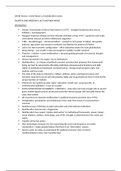Samenvatting
SUMMARY - Social Environment and Behavior (entire book)
- Instelling
- Rijksuniversiteit Groningen (RuG)
This is a summary on the entire book (chapter 1 through 17) "applied social psychology: understanding and managing social problems" by Linda Steg, Kees Keizer, Abraham P. Buunk, and Talib Rothengatter (2nd edition).
[Meer zien]








